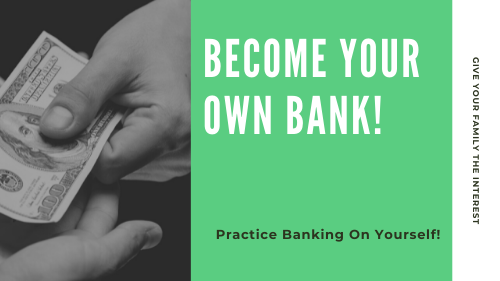What Does “Bank on Yourself ” Mean?
In the book Bank On Yourself by Pamela Yellen, she explains the “Bank On Yourself” concept as buying a whole life insurance policy on yourself, funding the insurance cash value using paid up additions (overfunding the cash value), then borrowing from the cash value when you need a loan (like to pay for university tuition).
Essentially you’re borrowing money (from yourself) against your insurance policy (instead of from your bank) but the cash value in your policy will continue to grow as if you didn’t take the loan, providing you continue to pay your premium or your premium is already paid up.
This type of loan is a collateral loan where the insurance death benefit is treated as the collateral. And even though the loan must be repaid with interest like any traditional loans, unlike a regular loan, you can pay the insurance policy back if and when you like. If you choose to not repay the loan, when you die, the loan, interest, and all related fees will be deducted from the death benefit. Then the balance is paid out to your beneficiary.
Although I’m using the “Bank on Yourself” term here, my focus will not be on insurance. It is the general concept of borrowing from yourself or family members that I will be utilizing to demonstrate how you can bank on yourself and your family so that you pay yourself or them interest instead of giving it to the bank, making the bank-man richer, while you and your family could benefit from it more.
In a previous blog I shared that you should first pay yourself 10% of your income (more or less depending on your financial situation) before you pay anyone else. You should treat this like a monthly financial bill payment, except this bill is giving back to you instead of taking away from you. It is also important that you encourage your children to save 10% of their allowance or monetary gifts so that they acquire the habits of, not only saving from an early age, but saving a percentage of their earnings before they start to spend it.
How Does The Bank On Yourself Work?
I will use examples from my lived experience to explain.
I have automatic savings that go from my checking account (where my monthly income goes) to different accounts, which I call money buckets. For instance, I have:
- A savings bucket for regular savings
- A vacation bucket, where I save for vacations
- A tax bucket, where I save for my property tax
- A maintenance bucket, where I put money for unexpected expenses
For the tax bucket, for example, I divide my annual property tax by 12, and each month, that amount automatically goes from my checking account to the tax bucket.
Now, suppose I have an unexpected expense, like the time my car’s power steering pump failed, and my service guy presented me with a whopping bill north of $1,700. As there wasn’t enough funds in the maintenance bucket to cover the service and repair cost, I borrowed money from the tax bucket to help pay for it. But I paid back the tax bucket at a higher interest rate than I would on my line of credit. Why?
Well, if I had no money buckets, and I had to borrow the money from my line of credit, I would have to pay the bank interest. If I have no qualms paying the bank interest, why not pay myself the interest instead? After all, I did borrow the money, albeit from myself.
I call this situation “Banking on Myself”…I became my own bank…because I borrowed from myself and I paid myself the interest that I would have normally given to the bank. So I reaped the interest benefits.
How Does The Bank On Your Family Work?
There have been occasions when a few of my properties need repairs simultaneously. In order to not deplete my business account, I may decide that a business loan to help cover expenses is necessary. But do I run to the bank for that loan? Of course not! I run to my money buckets. But what if my buckets fall short? I would run to my sons’ savings.
I would negotiate an interest rate with them, draft a business agreement, and the business repays them over time. I have done the same with a few relatives too. Why should I pay the bank interest when I can pay it to my own children or other family members instead? I call this “banking on my family.”
And the best part is, the interest on a business loan is tax deductible! So it’s a WIN WIN situation! My family gets the interest and it is tax deductible for me!
These are just small scale examples of how you can bank on yourself or on your family members. But the principle can be extended to larger expenses like purchasing a car or a home.
I’ve done it and so can you!
Of course, you can’t borrow from and pay the interest to yourself or family members if no funds are available to borrow from. So the starting point is for everyone to practice good financial management and saving before unexpected expenses occur.
And while I’m sure you would prefer to pay your family member, instead of the bank, that 5% interest, I suspect you may like banking on [only] yourself better!😁😁
So do work on becoming your own bank first, especially for personal loans where the interest would not be tax deductible. Use OPM (Other People’s Money) when the reward to you is far greater or when you have no other choice.

